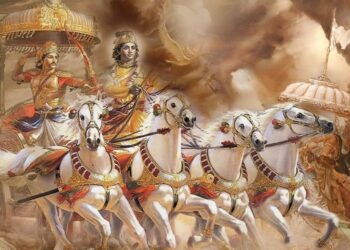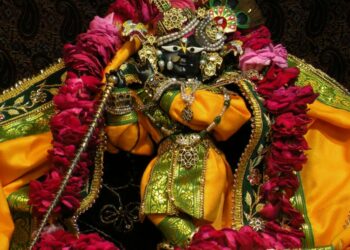TEXT 31
nāyaṁ loko ‘sty ayajñasya
kuto ‘nyaḥ kuru-sattama
SYNONYMS
na—never; ayam—this; lokaḥ—planet; asti—there is; ayajñasya—for one who performs no sacrifice; kutaḥ—where is; anyaḥ—the other; kuru-sat-tama—O best amongst the Kurus.
TRANSLATION
O best of the Kuru dynasty, without sacrifice one can never live happily on this planet or in this life: what then of the next?
PURPORT
Whatever form of material existence one is in, one is invariably ignorant of his real situation. In other words, existence in the material world is due to the multiple reactions to our sinful lives. Ignorance is the cause of sinful life, and sinful life is the cause of one’s dragging on in material existence. The human form of life is the only loophole by which one may get out of this entanglement. The Vedas, therefore, give us a chance for escape by pointing out the paths of religion, economic comfort, regulated sense gratification and, at last, the means to get out of the miserable condition entirely. The path of religion, or the different kinds of sacrifice recommended above, automatically solves our economic problems. By performance of yajña we can have enough food, enough milk, etc.—even if there is a so-called increase of population. When the body is fully supplied, naturally the next stage is to satisfy the senses. The Vedas prescribe, therefore, sacred marriage for regulated sense gratification. Thereby one is gradually elevated to the platform of release from material bondage, and the highest perfection of liberated life is to associate with the Supreme Lord. Perfection is achieved by performance of yajña (sacrifice), as described above. Now, if a person is not inclined to perform yajña according to the Vedas, how can he expect a happy life even in this body, and what to speak of another body on another planet? There are different grades of material comforts in different heavenly planets, and in all cases there is immense happiness for persons engaged in different kinds of yajña. But the highest kind of happiness that a man can achieve is to be promoted to the spiritual planets by practice of Kṛṣṇa consciousness. A life of Kṛṣṇa consciousness is therefore the solution to all the problems of material existence.
TEXT 32
evaṁ bahu-vidhā yajñā
vitatā brahmaṇo mukhe
karma-jān viddhi tān sarvān
evaṁ jñātvā vimokṣyase
SYNONYMS
evam—thus; bahu-vidhāḥ—various kinds of; yajñāḥ—sacrifices; vitatāḥ—are spread; brahmaṇaḥ—of the Vedas; mukhe—through the mouth; karma-jān—born of work; viddhi—you should know; tān—them; sarvān—all; evam—thus; jñātvā—knowing; vimokṣyase—you will be liberated.
TRANSLATION
All these different types of sacrifice are approved by the Vedas, and all of them are born of different types of work. Knowing them as such, you will become liberated.
PURPORT
Different types of sacrifice, as discussed above, are mentioned in the Vedas to suit the different types of worker. Because men are so deeply absorbed in the bodily concept, these sacrifices are so arranged that one can work either with the body, with the mind, or with the intelligence. But all of them are recommended for ultimately bringing about liberation from the body. This is confirmed by the Lord herewith from His own mouth.


















